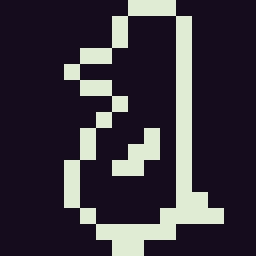Day 3: Gear Ratios
Megathread guidelines
- Keep top level comments as only solutions, if you want to say something other than a solution put it in a new post. (replies to comments can be whatever)
- Code block support is not fully rolled out yet but likely will be in the middle of the event. Try to share solutions as both code blocks and using something such as https://topaz.github.io/paste/ or pastebin (code blocks to future proof it for when 0.19 comes out and since code blocks currently function in some apps and some instances as well if they are running a 0.19 beta)
FAQ
- What is this?: Here is a post with a large amount of details: https://programming.dev/post/6637268
- Where do I participate?: https://adventofcode.com/
- Is there a leaderboard for the community?: We have a programming.dev leaderboard with the info on how to join in this post: https://programming.dev/post/6631465
🔒This post will be unlocked when there is a decent amount of submissions on the leaderboard to avoid cheating for top spots
🔓 Edit: Post has been unlocked after 11 minutes
I like it, it’s simple and to the point. I’ve learned that one of the most helpful things to do when solving these puzzles is to not make it more complicated than it needs to be, and you certainly succeeded better at that today than I did.
My solution for day 1 part 1 was simple and to the point. The other ones are getting increasingly less so. You’re right that sometimes it’s best not to get too fancy, but I think soon I may have to break out such advanced programming techniques as “functions” and maybe “objects”, instead of writing increasingly convoluted piles of nested loops. xD
Hi there! Looks like you linked to a Lemmy community using a URL instead of its name, which doesn’t work well for people on different instances. Try fixing it like this: !nim@programming.dev
nested loops
This is the way
That was not fun to solve. Lots of ugly code. This is a less ugly second version. Language: Nim.
Rust
I’ve been using Regexes for every day so far, this time it helped in finding numbers along with their start and end position in a line. For the second part I mostly went with the approach of part 1 which was to look at all numbers and then figure out if it has a part symbol around it. Only in part 2 I saved all numbers next to a gear
*in a hash table that maps each gear position to a list of adjacent numbers. Then in the end I can just look at all gears with exactly 2 numbers attached.Also it has to be said, multiplying two numbers is the exact opposite of getting their ratio!
I wrote today’s program in Python. (I am going to do a different language each day.) The only thing that gave me a little trouble was I was counting “\n” as a part label. Once I realized that I was able to get both problems done very quickly.
My code for the two parts is on github:-
deleted by creator
just more parsing problems
Language: C#
I aimed at keeping it as simple and short as reasonably possible this time, no overbuilding here!
I even used a goto to let me break out of multiple loops at once 🤮 (I had to look up how they worked!) I would totally fail me in a code review!
One solution for both
internal class Day3 : IRunnable { public void Run() { var input = File.ReadAllLines("Days/Three/Day3Input.txt"); int sum = 0; string numStr = ""; var starMap = new Dictionary<(int,int),List>(); for (int i = 0; i < input.Length; i++) for (int j = 0; j < input[i].Length; j++) { if (char.IsDigit(input[i][j])) numStr += input[i][j]; if (numStr.Length > 0 && (j == input[i].Length - 1 || !char.IsDigit(input[i][j + 1]))) { for (int k = Math.Max(0, i - 1); k < Math.Min(i + 2, input.Length); k++) for (int l = Math.Max(0, j - numStr.Length); l < Math.Min(j + 2, input[i].Length); l++) if (!char.IsDigit(input[k][l]) && input[k][l] != '.') { sum += int.Parse(numStr); if (input[k][l] == '*') { if (starMap.ContainsKey((k, l))) starMap[(k, l)].Add(int.Parse(numStr)); else starMap.Add((k,l),new List { int.Parse(numStr) }); } goto endSymbSearch; } endSymbSearch: numStr = ""; } } Console.WriteLine("Result1:"+sum.ToString()); Console.WriteLine("Result2:" + starMap.Where(sm => sm.Value.Count == 2).Sum(sm => sm.Value[0] * sm.Value[1])); } }My Python solution for part 1 and part 2. I really practice my regex skills.
spoiler
#!/usr/bin/python3 import re value_re = '(\d+)' symbol_re = '[^\d.]' gear_re = '(\*)' def main(): input = list() with open("input.txt", 'r') as in_file: for line in in_file: input.append(line.strip('\n')) length = len(input) width = len(input[0]) value_sum = 0 for idx, line in enumerate(input): for match in re.finditer(value_re, line): for line_mask in input[max(idx - 1, 0):min(idx + 2, length)]: valid_chars = line_mask[max(match.span()[0] - 1, 0):min(match.span()[1] + 1, width)] if re.search(symbol_re, valid_chars): value_sum += int(match[0]) break print(f"Value sum = {value_sum}") gear_ratio = 0 for idx, line in enumerate(input): for match in re.finditer(gear_re, line): valid_lines = input[max(idx - 1, 0):min(idx + 2, length)] min_range = max(match.span()[0] - 1, 0) max_range = min(match.span()[1], width) num_of_adjacent = 0 temp_gear_ratio = 1 for valid_line in valid_lines: for match in re.finditer(value_re, valid_line): if match.span()[0] in range(min_range,max_range + 1) or match.span()[1] - 1 in range(min_range,max_range + 1): num_of_adjacent += 1 temp_gear_ratio *= int(match[0]) if num_of_adjacent == 2: gear_ratio += temp_gear_ratio print(f"Gear ratio = {gear_ratio}") if __name__ == '__main__': main()Edit: Updated now with part 2.
Managed to have a crack at this a bit earlier today, I’ve only done Part 01 so far. I’ll update with Part 02 later.
I tackled this with the personal challenge of not loading the entire puzzle input into memory, which would have made this a bit easier.
Solution in Rust 🦀
use std::{ env, fs, io::{self, BufRead, BufReader, Read}, }; fn main() -> io::Result<()> { let args: Vec = env::args().collect(); let filename = &args[1]; let file1 = fs::File::open(filename)?; let file2 = fs::File::open(filename)?; let reader1 = BufReader::new(file1); let reader2 = BufReader::new(file2); println!("Part one: {}", process_part_one(reader1)); println!("Part two: {}", process_part_two(reader2)); Ok(()) } fn process_part_one(reader: BufReader) -> u32 { let mut lines = reader.lines().peekable(); let mut prev_line: Option = None; let mut sum = 0; while let Some(line) = lines.next() { let current_line = line.expect("line exists"); let next_line = match lines.peek() { Some(Ok(line)) => Some(line), Some(Err(_)) => None, None => None, }; match (prev_line, next_line) { (None, Some(next)) => { let lines = vec![¤t_line, next]; sum += parse_lines(lines, true); } (Some(prev), Some(next)) => { let lines = vec![&prev, ¤t_line, next]; sum += parse_lines(lines, false); } (Some(prev), None) => { let lines = vec![&prev, ¤t_line]; sum += parse_lines(lines, false); } (None, None) => {} } prev_line = Some(current_line); } sum } fn process_part_two(reader: BufReader) -> u32 { let mut lines = reader.lines().peekable(); let mut prev_line: Option = None; let mut sum = 0; while let Some(line) = lines.next() { let current_line = line.expect("line exists"); let next_line = match lines.peek() { Some(Ok(line)) => Some(line), Some(Err(_)) => None, None => None, }; match (prev_line, next_line) { (None, Some(next)) => { let lines = vec![¤t_line, next]; sum += parse_lines_for_gears(lines, true); } (Some(prev), Some(next)) => { let lines = vec![&prev, ¤t_line, next]; sum += parse_lines_for_gears(lines, false); } (Some(prev), None) => { let lines = vec![&prev, ¤t_line]; sum += parse_lines_for_gears(lines, false); } (None, None) => {} } prev_line = Some(current_line); } sum } fn parse_lines(lines: Vec<&String>, first_line: bool) -> u32 { let mut sum = 0; let mut num = 0; let mut valid = false; let mut char_vec: Vec> = Vec::new(); for line in lines { char_vec.push(line.chars().collect()); } let chars = match first_line { true => &char_vec[0], false => &char_vec[1], }; for i in 0..chars.len() { if chars[i].is_digit(10) { // Add the digit to the number num = num * 10 + chars[i].to_digit(10).expect("is digit"); // Check the surrounding character for non-period symbols for &x in &[-1, 0, 1] { for chars in &char_vec { if (i as isize + x).is_positive() && ((i as isize + x) as usize) < chars.len() { let index = (i as isize + x) as usize; if !chars[index].is_digit(10) && chars[index] != '.' { valid = true; } } } } } else { if valid { sum += num; } valid = false; num = 0; } } if valid { sum += num; } sum } fn parse_lines_for_gears(lines: Vec<&String>, first_line: bool) -> u32 { let mut sum = 0; let mut char_vec: Vec> = Vec::new(); for line in &lines { char_vec.push(line.chars().collect()); } let chars = match first_line { true => &char_vec[0], false => &char_vec[1], }; for i in 0..chars.len() { if chars[i] == '*' { let surrounding_nums = get_surrounding_numbers(&lines, i); let product = match surrounding_nums.len() { 0 | 1 => 0, _ => surrounding_nums.iter().product(), }; sum += product; } } sum } fn get_surrounding_numbers(lines: &Vec<&String>, gear_pos: usize) -> Vec { let mut nums: Vec = Vec::new(); let mut num: u32 = 0; let mut valid = false; for line in lines { for (i, char) in line.chars().enumerate() { if char.is_digit(10) { num = num * 10 + char.to_digit(10).expect("is digit"); if [gear_pos - 1, gear_pos, gear_pos + 1].contains(&i) { valid = true; } } else if num > 0 && valid { nums.push(num); num = 0; valid = false; } else { num = 0; valid = false; } } if num > 0 && valid { nums.push(num); } num = 0; valid = false; } nums } #[cfg(test)] mod tests { use super::*; const INPUT: &str = "467..114.. ...*...... ..35..633. ......#... 617*...... .....+.58. ..592..... ......755. ...$.*.... .664.598.."; #[test] fn test_process_part_one() { let input_bytes = INPUT.as_bytes(); assert_eq!(4361, process_part_one(BufReader::new(input_bytes))); } #[test] fn test_process_part_two() { let input_bytes = INPUT.as_bytes(); assert_eq!(467835, process_part_two(BufReader::new(input_bytes))); } }Python
Questions and comments welcome!
import collections import re from .solver import Solver class Day03(Solver): def __init__(self): super().__init__(3) self.lines = [] def presolve(self, input: str): self.lines = input.rstrip().split('\n') def solve_first_star(self): adjacent_to_symbols = set() for i, line in enumerate(self.lines): for j, sym in enumerate(line): if sym in ('0', '1', '2', '3', '4', '5', '6', '7', '8', '9', '.'): continue for di in (-1, 0, 1): for dj in (-1, 0, 1): adjacent_to_symbols.add((i + di, j + dj)) numbers = [] for i, line in enumerate(self. lines): for number_match in re.finditer(r'\d+', line): is_adjacent_to_symbol = False for j in range(number_match.start(), number_match.end()): if (i, j) in adjacent_to_symbols: is_adjacent_to_symbol = True if is_adjacent_to_symbol: numbers.append(int(number_match.group())) return sum(numbers) def solve_second_star(self): gear_numbers = collections.defaultdict(list) adjacent_to_gears = {} for i, line in enumerate(self.lines): for j, sym in enumerate(line): if sym == '*': for di in (-1, 0, 1): for dj in (-1, 0, 1): adjacent_to_gears[(i + di, j + dj)] = (i, j) for i, line in enumerate(self. lines): for number_match in re.finditer(r'\d+', line): adjacent_to_gear = None for j in range(number_match.start(), number_match.end()): if (i, j) in adjacent_to_gears: adjacent_to_gear = adjacent_to_gears[(i, j)] if adjacent_to_gear: gear_numbers[adjacent_to_gear].append(int(number_match.group())) ratios = [] for gear_numbers in gear_numbers.values(): match gear_numbers: case [a, b]: ratios.append(a * b) return sum(ratios)Crystal
My computer crashed right most of the way through and I lost everything, so this was even more frustrating than it should have been
Also damn, lemmy’s tabs are massivewill post part 2 when I get to it
input = File.read("input.txt") lines = input.lines.map(&.chars) sum = 0 num_marker = nil lines.each_with_index do |line, y| line.each_with_index do |char, x| num_marker ||= x if char.number? if (!char.number? || x == line.size-1) && num_marker if check_symbol(y, (num_marker-1)..x, lines) sum += lines[y][(char.number? ? num_marker..x : num_marker...x)].join.to_i end num_marker = nil end end end puts sum def check_symbol(y, rx, lines) carr = [ lines[y][rx.begin]?, lines[y][rx.end]? ] carr += rx.map {|x| lines[y-1][x]? } if y > 0 carr += rx.map {|x| lines[y+1][x]? } if y < lines.size-1 carr.each {|c| return true if c && c != '.' && !c.number?} false endInput parsing AGAIN?
Lua
-- SPDX-FileCopyrightText: 2023 Jummit -- -- SPDX-License-Identifier: GPL-3.0-or-later local lines = {} for line in io.open("3.input"):lines() do table.insert(lines, "."..line..".") end local width = #lines[1] local height = #lines local function at(x, y, w) if y < 1 or y > height then return nil end return lines[y]:sub(x, x + w - 1) end local sum = 0 local gears = {} for y, line in ipairs(lines) do local start = 1 local outLine = line while true do local newStart, numEnd = line:find("%d+", start) if not newStart then break end local symbol = false local num = tonumber(line:sub(newStart, numEnd)) for y = y - 1, y + 1 do local surrounding = at(newStart - 1, y, numEnd - newStart + 3) if surrounding then if surrounding and surrounding:match("[^.%d]") then symbol = true end for i = 1, #surrounding do local gear = surrounding:sub(i, i) == "*" if gear then if not gears[y] then gears[y] = {} end local x = i + newStart - 2 if not gears[y][x] then gears[y][i + newStart - 2] = {} end table.insert(gears[y][x], num) end end end end if symbol then sum = sum + num end start = numEnd + 1 end end print(sum) local ratio = 0 for _, line in pairs(gears) do for _, gears in pairs(line) do if #gears == 2 then ratio = ratio + gears[1] * gears[2] end end end print(ratio)Hare (Part one only)
// SPDX-FileCopyrightText: 2023 Jummit // // SPDX-License-Identifier: GPL-3.0-or-later use strings; use regex; use fmt; use os; use bufio; use io; use strconv; use types; fn star_in(lines: []str, x: uint, y: uint, w: uint) bool = { let start = y; if (start > 0) start -= 1; let end = y + 1; if (end >= len(lines)) end -= 1; const re = regex::compile(`[^.0-9]`)!; for (let h = start; h <= end; h += 1) { fmt::println(strings::sub(lines[h], x, x + w))!; if (regex::test(&re, strings::sub(lines[h], x, x + w))) { fmt::println("")!; return true; }; }; fmt::println("")!; return false; }; export fn main() void = { const file = os::open("3.input")!; defer io::close(file)!; const buf = bufio::newscanner(file, types::SIZE_MAX); let lines: []str = []; defer strings::freeall(lines); for (true) { match (bufio::scan_line(&buf)!) { case io::EOF => break; case let line: const str => append(lines, strings::dup(line)); }; }; const height = len(lines); const width = len(lines[0]); let sum: uint = 0; let gears: [](uint, uint) = []; const num_re = regex::compile(`[0-9]+`)!; for (let y = 0u; y < len(lines); y += 1) { let nums = regex::findall(&num_re, lines[y]); defer regex::result_freeall(nums); for (let i = 0z; i < len(nums); i += 1) { for (let j = 0z; j < len(nums[i]); j += 1) { const find = nums[i][j]; const num = strconv::stou(find.content)!; let start = find.start: uint; let w = len(find.content): uint + 2; if (start > 0) { start -= 1; } else { w -= 1; }; if (star_in(lines, start, y, w)) { sum += num; }; }; }; }; fmt::printfln("{}", sum)!; };Ruby
My goodness I struggled today. https://github.com/snowe2010/advent-of-code/blob/master/ruby_aoc/2023/day03/day03.rb
Hi there! Looks like you linked to a Lemmy community using a URL instead of its name, which doesn’t work well for people on different instances. Try fixing it like this: !ruby@programming.dev
Language: C++
Efficiency? Elegant Code? Nope but It works. Luckily I did part 1 by looking at the symbols first anyway, so extending to part two was trivial. Also originally had a bug where I treated all symbols as cogs, not only ‘*’. Interestingly it worked anyway as only '*'s had two adjacent numbers in my data. It is fixed in this version. Hacked together combined code (originally I did each part as separate programs but they shared so much that I ended up combining then so the post is shorter): https://pastebin.com/Dij2XSYe
Edit: anything in angle brackets is not displaying even with backslashes, idk why but i have moved the code to a pastebin.
Python, used a number map to search positions near symbols.
https://github.com/massahud/advent-of-code-2023/blob/main/day03/day03.ipynb














